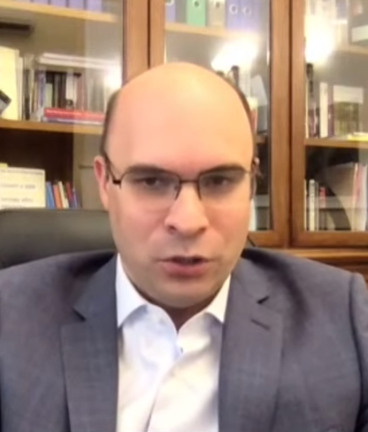Russia’s central bank is exploring a two-tiered digital ruble that would allow users to restrict certain types of purchases, and all transactions would be recorded on a centralized ledger, according to a Cyber Polygon 2021 panel discussion.
“Just imagine that you are able to give your kids some money in digital rubles and then restrict their use for purchase of junk food” — Alexey Zabotkin, Deputy Governor of Russia’s Central Bank, Cyber Polygon 2021
Speaking at the annual Cyber Polygon cybersecurity exercise, Bank of Russia Deputy Governor Alexey Zabotkin laid out the central bank’s plan for a digital ruble.
“The digital ruble shall be more convenient than cash is in its use,” he said, adding, “the digital ruble will exist in the form of uniquely identifiable units — you can think about them as sort of electronic bank notes.”
With these electronic bank notes, users would be able to set limits on what types of purchases can be made.
“This [digital ruble] will permit better traceability of payments and money flow, and also explore the possibility of setting conditions on permitted terms of use of a given unit of currency,” said Zabotkin.

Alexey Zabotkin
“The Bank of Russia will maintain the centralized ledger on the Bank of Russia’s technological platform, and all transactions will be recorded on this ledger” — Alexey Zabotkin, Cyber Polygon 2021
The Russian central bank authority said that parents could give the digital currency to their children with certain restrictions, such as blocking them from buying junk food.
“Just imagine that you are able to give your kids some money in digital rubles and then restrict their use for purchase of junk food, for example.
“That would be a useful functionality for a customer, and of course you can come up with hundreds of other similar use cases,” Zabotkin added.
You can let your imagination run wild with what those “hundreds of other similar use cases” could be, but if parents could be allowed to alter the permissions on the digital money, then surely much more powerful entities would be able to do the same, no?
“This [digital ruble] will permit better traceability of payments and money flow, and also explore the possibility of setting conditions on permitted terms of use of a given unit of currency” — Alexey Zabotkin, Cyber Polygon 2021
The World Economic Forum, which is a major partner of the Cyber Polygon exercise, has made its entire platform based on establishing public and private partnerships.
Where governments are limited in their knowledge and power, the private sector can sweep in to fill the void.
In the case of digital currencies, would private payment providers and other financial entities be able to set their own rules on what types of purchases they would allow on their platforms?
If this were to happen in the US, could a private bank or fintech company put a “terms of use” on the money that could allow a customer to buy a car, for example, but restrict them from buying a firearm?
“Last mile access will remain in the hands of the commercial banks, plus possibly other authorized and properly supervised payment service providers” — Alexey Zabotkin, Cyber Polygon 2021
According to the Russian central bank exec, the digital ruble’s “last mile access will remain in the hands of the commercial banks, plus possibly other authorized and properly supervised payment service providers.
“They will integrate access to digital ruble wallets into their apps, will handle KYC and onboarding of new users, and will devise new products and services, which exploit innovative functionalities of the digital ruble,” he added.
In times of resource shortages, could the last mile access of commercial banks allow them to restrict purchases on certain quantities of goods such as gasoline, meat, or toilet paper, depending on which permissions they allow on the digital currency that they supply?
“We see the digital ruble implementation as a two-tiered system” — Alexey Zabotkin, Cyber Polygon 2021
Additionally, Russia’s central bank is planning to implement a digital ruble where all transactions would be recorded on a centralized ledger.
“We see the digital ruble implementation as a two-tiered system,” said Zabotkin.
“The Bank of Russia will maintain the centralized ledger on the Bank of Russia’s technological platform, and all transactions will be recorded on this ledger,” the central bank exec added.
Under this CBDC scheme, all transactions would be recorded on a single, centralized ledger.
Zabotkin went on to say that the digital ruble would be a choice, and that people could still use cash if they wanted to.
“It will be up to the users to choose between the use of the electronic bank money or the digital ruble, as they choose today between the electronic bank money and cash” — Alexey Zabotkin, Cyber Polygon 2021
However, the central bank representative highlighted that the digital ruble would “increase competition” and “create a more level playing field in the payments industry.”
When you take into account Zabotkin’s first assertion that the “digital ruble will be more convenient than cash,” and add in the “increase competition” factor, then it appears that Russia’s central bank is betting on the Centralized Digital Bank Currency to win out in the end.
The digital ruble, according to the bet, would be more convenient and more competitive — but at the same time — it would also be centralized, recorded on a ledger, and come with the ability to restrict purchases.
Convenience comes with a price of freedom, anonymity, and limited purchasing power.
“The [digital ruble] shall increase competition and will create a more level playing field in the payments industry” — Alexey Zabotkin, Cyber Polygon 2021
Zabotkin added that “the digital ruble will provide people and businesses with a very basic, but uniformly and cheaply accessible alternative to electronic bank money.
“It will be up to the users to choose between the use of the electronic bank money or the digital ruble, as they choose today between the electronic bank money and cash.
“But it shall increase competition and will create a more level playing field in the payments industry, and the results shall be the lower cost and enhanced, more-efficient money technology for economic agents,” he concluded.
Following up on last year’s cyber pandemic simulation, this year’s Cyber Polygon held live training exercises responding to “a targeted supply chain attack on a corporate ecosystem in real time.”
Running parallel to the training exercise were discussions on how to tackle everything from ransomware and supply chain attacks to implementing “resilient” digital currencies, and a desire for global governance on the internet.
Prepping for a cyber pandemic: Cyber Polygon 2021 to stage supply chain attack simulation












